 population.com.au
population.com.auLast official estimated population of Darwin (as Significant Urban Area) was 134 802 people (on 2017-06-30)[2]. This was 0.54% of total Australian population. Area of Darwin is 374.43 km², in this year population density was 360.01 p/km² . If population growth rate would be same as in period 2016-2017 (+1.28%/yr), Darwin population in 2025 would be 149 243. [0]



Click to enlarge. Darwin is located in the center of the images.
Population [people], population density [p./km²] and population change [%/year] [2]
[2001-2002] +0.47 %/Y
[2002-2003] +0.84 %/Y
[2003-2004] +0.68 %/Y
[2004-2005] +1.95 %/Y
[2005-2006] +1.83 %/Y
[2006-2007] +5.42 %/Y
[2007-2008] +3.41 %/Y
[2008-2009] +3.17 %/Y
[2009-2010] +1.70 %/Y
[2010-2011] +0.82 %/Y
[2011-2012] +3.09 %/Y
[2012-2013] +4.07 %/Y
[2013-2014] +1.75 %/Y
[2014-2015] +2.64 %/Y
[2015-2016] +1.53 %/Y
[2016-2017] +1.28 %/Y
[0] Calculated with linear interpolation from officially estimated population
[1] Read more about SUA and Australian Statistical Geography Standard (ASGS) on abs.gov.au
[2] Population data from Australian Bureau of Statistics (Population and density: 2017; change: 2016-2017)
[3] Digital Boundaries: Australian Statistical Geography Standard (ASGS) 2016.